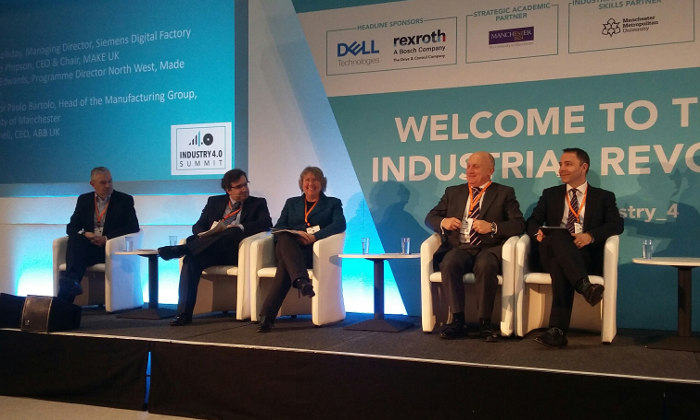New vision to ensure Manchester is a pioneer for latest industrial revolution
11 Apr 2019
The University of Manchester is to launch its ambitious vision to help ensure the city is a leader in the fourth industrial revolution in the same way it was a pioneer for the first phase of industrialisation

The University will launch its blueprint for Industry 4.0, the term given to the latest phase of the industrialisation process which will be transformed by digital technologies such as 3D printing, smart factories, robotics and big data connectivity provided by the Internet of Things and AI.
The strategy document will highlight how the University will:
• deliver skills to support new, high-paid employees and business leaders
• work across all disciplines – including engineering, health and social sciences – to deliver applied research and expertise to support Industry 4.0 technologies and applications
• support the city-region’s economic strategies, including the aim to develop world-leading expertise in areas such as cyber security and robotics to position Manchester globally as a key location for firms developing Industry 4.0 technologies.
• provide a business-academic partnership model of Industry 4.0 innovation for the UK’s higher education sector and to attract support from the UK government.
The University’s vision will be launched at the prestigious Industry 4.0 Summit on April 11 and will set out a comprehensive framework spanning national and regional industrial research priorities, as well as the teaching and learning approach required to produce future-ready industrialists.
“The University of Manchester is taking steps to cement its place as a world-leading hub for Industry 4.0 solutions in engineering, health and social sciences,” explained Professor Paulo Bartolo, the University’s academic lead for Industry 4.0.
“With our world-class academic excellence, as well as the geographic and cultural pull of its home city, The University of Manchester is uniquely positioned to be an exemplar of the leadership required from the UK’s higher education sector.
“Taking the example of advanced materials – a core technology propelling Industry 4.0 – we are home to around £420 million-worth of internationally-renowned research and business innovation centres.”
These Manchester-based centres of excellence include:
• National Graphene Centre and the Graphene Engineering Innovation Institute which help make Manchester the ‘Home of Graphene’
• The Henry Royce Institute, the UK’s national institute for advanced materials research and innovation
• BP International Centre for Advanced Materials, an international centre of excellence in advanced materials research.
And these world-class hubs provide the ingredients of an ecosystem that can help build a talent supply chain.
“In other words, we have a track record in delivering on areas that are vital for Industry 4.0. This was made possible because of our success at grassroots level, with a critical mass of researchers at the forefront of Industry 4.0’s technologies and societal and economic impact,” added Professor Bartolo.
The University’s proposals are also in line with region’s economic strategies - positioning The University of Manchester as a lead knowledge partner for the city-region’s international Industry 4.0 offer.
“The University of Manchester’s proposition around Industry 4.0 aligns seamlessly with the Greater Manchester Industrial and Digital Strategy,” said Tim Newns, CEO of MIDAS, the agency that works to attract inward investment into the Greater Manchester city-region.
“Technology and innovation in fields such as AI, robotics, additive manufacturing, virtual and augmented reality, the Internet of Things, and the convergence of these technologies, can make a considerable impact on increasing the competitiveness of the manufacturing industry.
“The city is developing expertise in areas such as cyber security and robotics, positioning it as a key location for companies developing Industry 4.0 technologies and with access to significant market opportunities.”
